Sometimes the creative process can feel like a total mess. So can your efforts to share your writing with others. Today I want to share a case study about that, with the hopes that it gives you a sense of permission to keep going, even if you feel that how you create and share lacks the clarity and structure you hope for.
A few months ago, I wrote a post on 23 lessons to learn from The Beatles about the creative process. Today I want to do a similar case study, but with a creator who is not nearly as famous as The Beatles. I had written about this person a year ago when he released a comedy special on Netflix. It was an hour-long video filmed in one room by himself during the pandemic.
Well, he recently released another video that shows behind-the-scenes outtakes from creating his comedy special. I want to talk bout that today. Even though he focuses on songs, comedy skits, and video, I think this example is applicable to someone who is writing a novel, or trying to grow their author platform via a newsletter. Deep down, the creative process and our ability to market our work to others is less about the specific medium, and more about the human-centered process of creating art and having that impact the lives of others.
There are so many ways the creative process can be messy: how you land on the idea of a book you want to write, how you get the words down on the page, and how you get to a finished piece you are proud of. In the work I do with writers and creators, I help provide a system for how to share what you create with a sense of authenticity and strategy. We create a step-by-step plan that fits within their otherwise busy lives. We focus on clear goals, but also a fulfilling experience.
But, just like the creative process, sometimes the sharing process is messy. And that’s okay. Today I want to explore why that can be useful to you. If you feel like so often you feel like you have no idea what you are doing and your “strategy” is a disaster, maybe that’s good!
(Oh wait, one big caveat first: the video I’m talking about is by Bo Burnham, who is a comedian. He intentionally crosses lines in his comedy and presents skits as characters. Honestly, aspects of his comedy will likely offend you. So I’m not even going to link to it. I will write the piece below without you needing to watch his videos or like his comedy. If you do want to see the videos, you can search for “Bo Burnham Inside” or “Bo Burnham Inside Outtakes” in a search engine. I’m not here advocating for or against his content. I’m featuring it because it is an instructive look at the creative process.)
If you are wondering why I’m focusing on this guy and this video, its worth noting that his comedy special did pretty well:
- It won him a Grammy award.
- It has been the #1 selling comedy album on the Billboard charts for an entire year.
- Songs from this special have tens of millions of views on YouTube.
In other words: this comedy special was ridiculously successful. Even though in every screenshot I share below, it likely won’t look that way. It will look like some random guy sitting in a room by himself. Which is exactly why I thought this was a great example for how we can all feel as we create and share our writing and art. Okay, let’s dig in…
“Trying to create while stuck in a room.”
“Trying to be funny while stuck in a room…” is the theme of one of the songs Bo sings in the special, ruminating on feeling isolation while creating. That’s what all writers and creators do. To create something magical from quiet solitude, and perhaps even, boredom.
He recorded this in one room. From what I can tell, it a small building in his backyard, that consists of one big room, a small kitchen, and a bathroom.
As the video progresses in his hour-long comedy special, you see time moving as his hair getting longer
the mess growing around him. At the start, he has short hair and he has some beard stubble. By the end, his hair is down to his shoulders, with a long beard.
There are many shots from the outtakes where Bo seems to intentionally want to make himself look pathetic as he tries to create. Shot after shot of him in a messy room, looking bored, and then another shot that just holds on him doing something ridiculous. Or a shot of him checking his phone, because he forgot to stop filming. Here is an example, two back to back shots, one in the day, one in the night, with him doing the same thing: checking his computer as he prepares to film something:
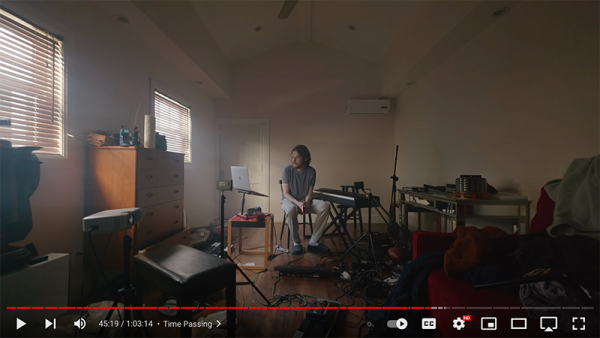
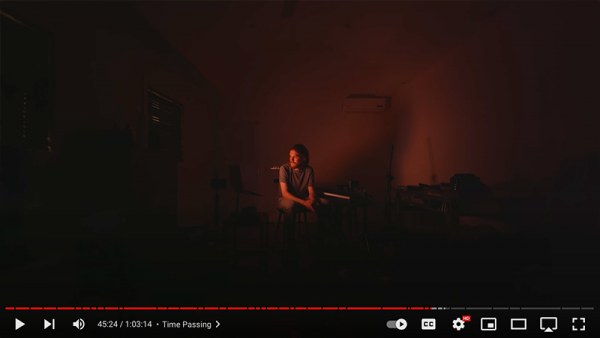
What I see here is that, in trying to create something that we feel speaks to who we are, that we hope truly brings joy to others, can be a long process of us sitting alone in a room. Not knowing if our ideas will work. Where we may even feel unable to reach the level of craft that we dream of.
Yet, this is the work of what it means to create something meaningful.
Sharing Takes Effort To Present Your Ideas and Yourself
When we try to share our creative work, there is a similar challenge. We try to follow the “best practices” of sharing often, with authenticity, feeling like you have some great system, and that it all results in a sense of confidence and fulfillment.
But, it doesn’t often feel that way.
In Bo’s video, he shares the behind the scenes of how he is sharing. You will see him walking from the camera after clicking ‘record’ or walking to it in order to stop recording. This is the work of sharing. It isn’t just a charismatic person capturing a natural moment. It takes effort to present your ideas and yourself.
Bo’s original comedy special was filled with songs and skits. In the outtakes, I see so many entire lighting effects or shots or ideas that never made it into the final video. Ideas he clearly spent hours on, testing and performing. And it ended up on the cutting room floor.
To a creator who is trying to share effectively, this can be discouraging. So many times over the years I’ve heard a writer say, “I just wasted three hours on my newsletter, trying to fix something.Ugh!!!!!” That’s unfortunate, and it’s easy to think, “Oh, these other successful writers don’t waste their days on technical issues with a newsletter. I’m pathetic. I’m doing it wrong. This is a waste. Why do I even need a newsletter?”
But again, this is the work. Why I’m writing an entire piece about Bo is to illustrate that. Here is someone who is very successful creating a video that will be very successful. And the entire process — to him– is filled with uncertainty, dead ends, and frustration. Is that the only way to create? Nope! Is it common if you experience it. Yep. So don’t feel bad about that.
In the outtakes, Bo shares entire segments of him just moving furniture to setup a shot. Even the framing is something he thought about here. My interpretation: “This is me setting up a shot for how you will see me, for how I will share.” Which is why the camera shows him in the background, and a video monitor in the foreground:
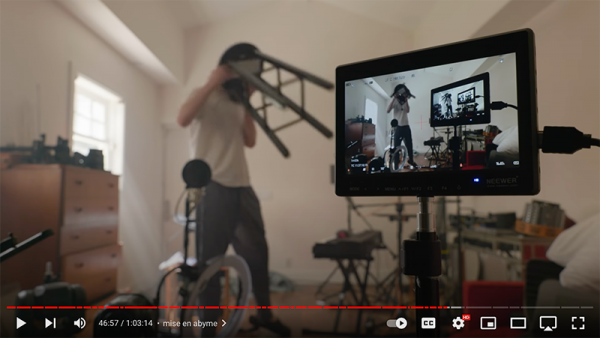
Progress Always Feels Distant
In the outtakes, Bo shares a scene where he addresses the camera directly: “I’ve been filming for a month now, and don’t have anything that is even close to usable yet.” But little by little, he created songs and skits he was satisfied with. Progress sneaks up on you. There is rarely a one-to-one ratio of “I tried something and I’m instantly rewarded with a sense of progress!” Return on investment for our time in creating and sharing is slow. It can take weeks, months, or years. But it is there.
You see the passing of time with quick cuts of him with short hair, then long.
Near the end of the outtakes, Bo addresses the camera again: “I’ve decided I’m going to stop doing this. I’ve been trying to finish this special for many months now. I keep thinking that I’m done, I’ll write an ending and I’ll film an ending, then I’ll edit it and I’ll watch it, and I’ll feel like I’m not done, I have to do something else. I feel like I’m waiting for some big idea that will tie it all together and make sense of it and satisfy me. But I don’t think that’s going to happen. And the more I wait for it, the more [expletive] I feel, and look. I realized the only way this thing is going to stop is if I stop doing it. Goodbye.”
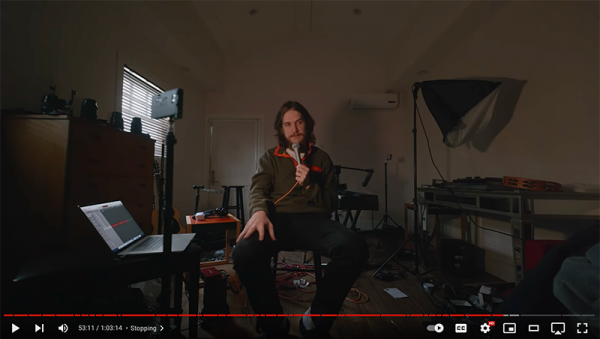
How You Create is a Craft. So Is How You Share
Throughout the outtakes, you see Bo testing the effects that will later appear in the final special. You see the ridiculous number of takes he has to do for each shot, but also setups: unique lighting, camera angles, etc.
Here is a montage that encapsulates so much about the craft of how we create and share. Here Bo is holding up colored lighting filters to see how they look in the room. In the first two, his hair is shorter. In the next two his hair is long. This is the boring work of craft. Here he is 10+ years into a successful career, at some odd hour of night still deciding: “purple or blue?” Then choice to show himself doing it with the longer hair illustrates: this work is never done. You always have to spend time on the details of craft. In your writing, you could be 12 books into your career and still struggle with basic dialogue, character development, book structure, or rewrite a sentence 100 times and still feel it isn’t right. In a newsletter, it could be draft after draft before you click “send.” This is the work.
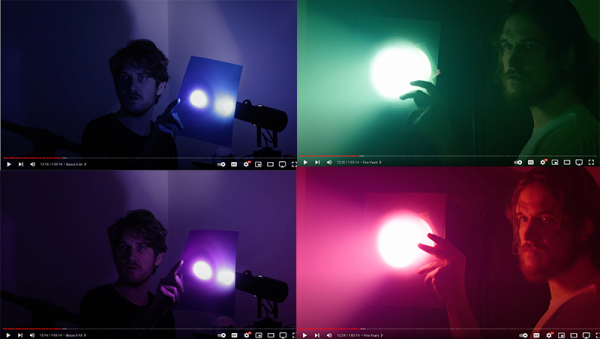
At one point, he shows behind the scenes of filming that don’t include the songs that these images are meant to be a part of. Watching someone performing like this (without the music) really shows the inner workings of the creative process, and how it can just look desperate when piecing it together. Just a guy fake laughing by himself in a messy room, take after take after take:
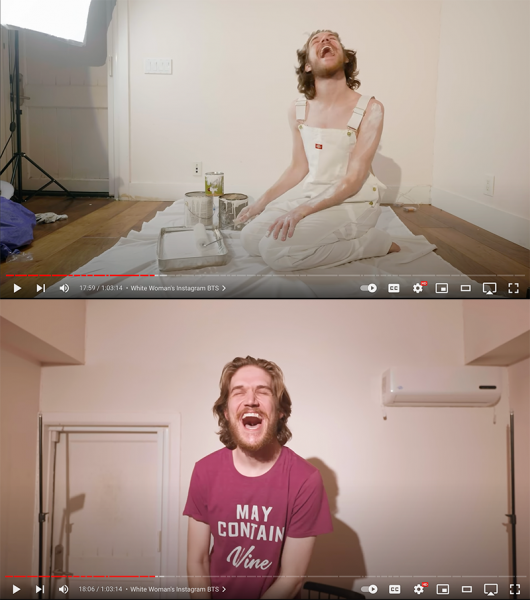
Later, he shares multiple takes of the exact same portion of a song. Of course, in the end, most nearly all of these shots weren’t used. For his art, this is both the creation of his work, but also the sharing of it. The songs are already recorded, so his performance is how he will share it. He could have just released an album with no video.
So if we consider a writer who wants to share a video on Instagram, they may do multiple takes too. But they may think, “Is this self-involved? Shouldn’t it just be natural? Shouldn’t I just be writing? Is this all for silly likes and gaming an algorithm?” Yet, much like Bo, it can be an essential part of the craft of how we share. These are all different takes for the same moment in each song. Doing the same thing again and again and again to get it good enough:
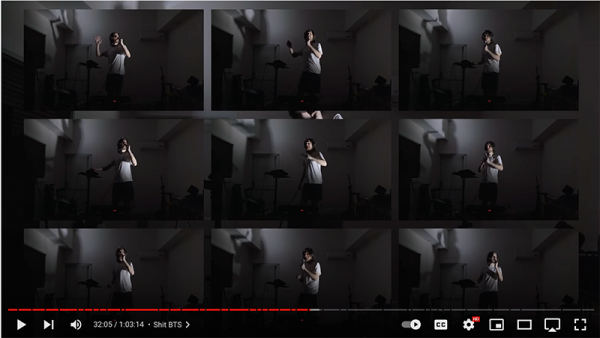
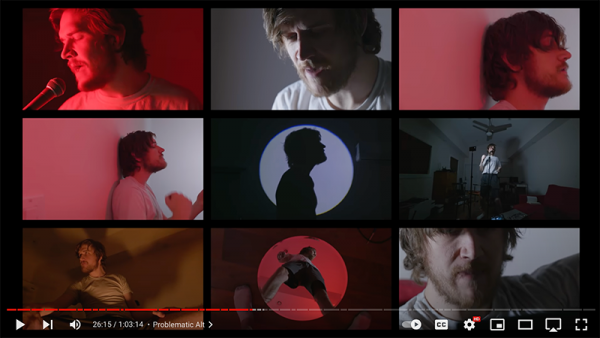
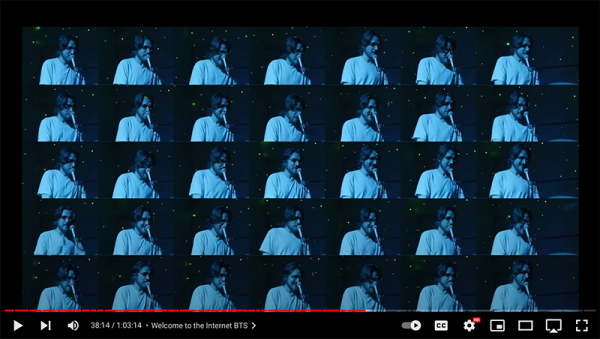
Finding Your Public Identity Is Difficult
Much of Bo’s performance feels personal, where you see him obviously performing in some sketches, then supposedly seeing the “real” Bo behind the scenes. But in truth, it is never clear if the real Bo shows up in any of this. Is the behind the scenes a performance too? Is everything Bo shares in character? Or, characters? Is that the point he is making? He presents shots like this, which look more impromptu in his kitchen, looking directly at the camera, and making seemingly confessional personal reflections:
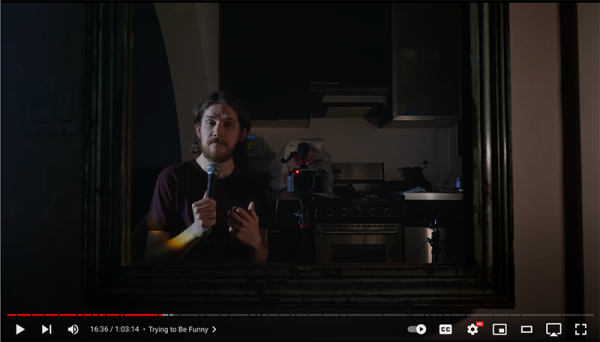
Yet, it is never clear if he is playing a character. I feel like he is. But it’s easy to conclude the opposite.
So many writers struggle with this to. How to present themselves online in a way that feels cohesive and approachable, but not in a fake and premeditated way. Bo started his career sharing videos from his bedroom as a 16 year old, back in 2006. I think more than most, he has evolved his sense of what needs to remain personal and what can be public.
Bo doesn’t do a lot of interviews or publicity anymore. I think he presents the work as the art, and his personal thoughts and experiences as private. Many of us would like to choose that same avenue. “Shouldn’t the work just speak for itself?” we may ask. But I don’t want to ignore the work he did to gain his initial audience. to sustain it. To give himself a platform and career. And how much of himself he put into creating these new videos.
Of course, to create and share your work, you take on many roles. In one skit, Bo takes on the role of a talkshow host, interviewing the entire creative team of the video he’s making. All of the roles are played by Bo because he created this award-winning comedy special by himself:
- Director
- Writer
- Editor
- Cinematographer
- Composer
- Producer
- Hair and makeup artist
- Star
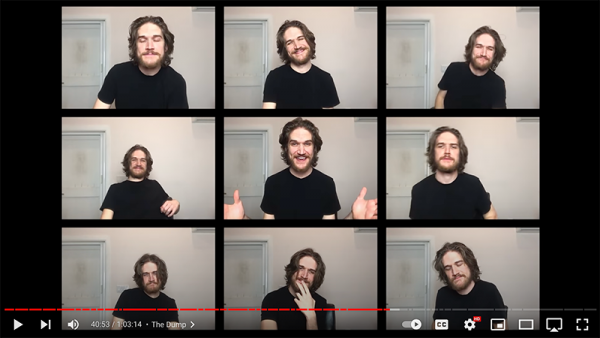
And this is something that many writers and creators bemoan. That they are expected to do so much. The flipside of how to look at this is that we get to do so much. Years ago Bo would have had to wait years to produce this. It would have required a dramatically bigger budget. It would never have turned out the way it did. Is that better? Worse? Well, it’s art, so who can say.
But Bo found himself on lockdown in 2020, and made this. It won him a Grammy award. It is the bestselling comedy album. I don’t know how many times the entire video special was streamed or how much he was paid. But on YouTube, one song has 81 million views. Another, 33 million views. Another, 25 million views.
It’s easy to look at someone like this and just say, “Oh, Bo is just massively talented. He would be successful no matter what.” Yet what he shares here is the work involved. He showcased the mess and uncertainty that many of us feel as we create. And to me, that feels welcome.
Ever feel like a mess in how you create and share?
Thanks.
-Dan
